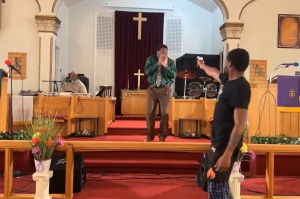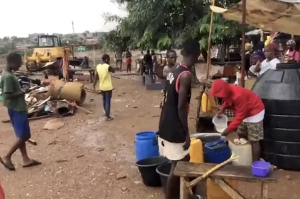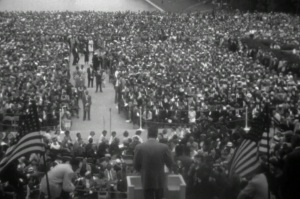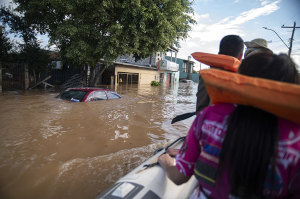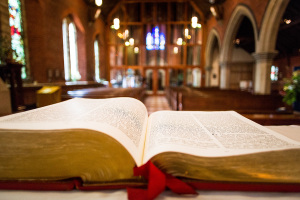'Political messianism:' What’s behind Christian persecution in Nicaragua?
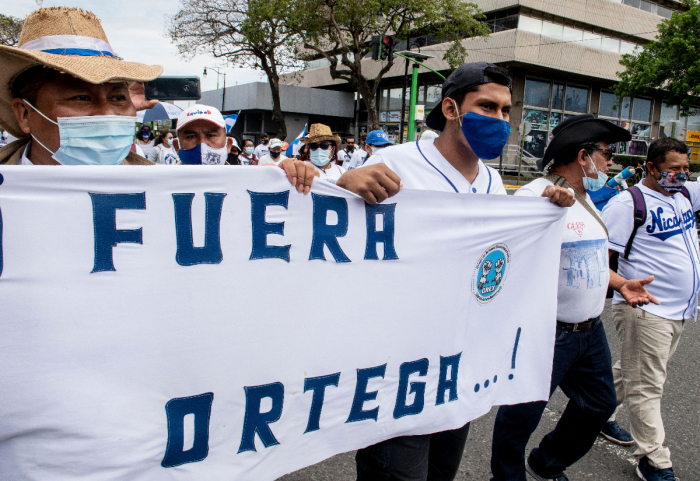
An ideological umbrella, which portrays President Daniel Ortega as being “anointed by God … for sacred Nicaragua,” is behind the persecution of Catholic and Protestant institutions and individuals in the Central American country, an adviser for the U.S. Conference of Catholic Bishops has said.
Dwight Bashir, the director of outreach and policy at the U.S. Commission on International Religious Freedom, hosted Christopher Ljungquist, an adviser for Latin America at the USCCB’s Office of International Justice and Peace, to spotlight Nicaragua’s “assault on religious freedom” in the bipartisan panel’s latest podcast last Friday.
A trend of persecution started in Nicaragua after protests against reforms to the public pension system in April 2018. The protests came after about a decade of deteriorating economic conditions in the country. Protesters, mostly students, demanded democratic reforms and that President Ortega and his wife, Vice President Rosario Murillo, step down as they allegedly established a dictatorship marked by nepotism and repression.
Hundreds of people died in the protests in 2018.
In 2021, the backdrop for the religious freedom violations was not the ongoing protests but rather the lead-up to the November general election in which Ortega won for a fourth consecutive term, Bashir said.
USCCB’s Ljungquist said that Ortega’s government operates under “political messianism,” a movement that sees itself as “the national savior, the national liberator.”
During the initial days of the 2018 protests, Ortega requested the Catholic Church to act as a mediator. But his administration also began to use brutal force against the protesters and later also on Catholic clergy.
Bashir said Catholic clergy aided and provided sanctuary to protesters and voiced support for the right to protest peacefully. But as a result, Ortega used his government and supporters to persecute clergy members, worshipers and various Catholic organizations.
Ljungquist said he visited Nicaragua in 2018 at the height of the protests. He reflected on Murillo’s rhetoric in her speeches, saying many believe she is the real power behind the throne.
“Her speeches are a theatrical and flamboyant brand of political preaching,” he said, adding that she combines “Christian symbology with New Age occultism.”
“She claims Nicaragua’s allegiance to ‘God and Daniel,’” he added. “They even dress statues of Mary in Sandinista colors.”
Like most totalitarian ideologies, "Sandinismo is hegemonic," he explained.
“It seeks to bring the entire Nicaraguan society, especially religion, under the ideological control of its movement,” Ljungquist said.
Against this backdrop, the conflict is “inevitable” when an institution like the Catholic Church calls the government to account, he warned, saying “political messiahs do not like to be questioned.”
The apparent reason behind the targeting of the Christians is to “gain silence … through intimidation,” according to Ljungquist. He said that 60% of the country’s population is Catholic, and “the rest look up to the Protestant ministers who are in line with the Catholic Church on this.”
“Here, we have a full Christian front advocating for civil liberties, for plurality and democratic process,” he added. “They want silence from the national conscience … silence from the message of reconciliation that the Church is preaching even now.”
The Church is the only institution with legitimacy, credibility and “the independence to challenge human rights abuses and the political abuses of the regime,” according to the USCCB adviser.
In 2020, Ljungquist said a cathedral was attacked in what the cardinal of Managua called a "terrorist attack,"
“A 400-year-old crucifix brought over from Spain was severely damaged," he said.
While physical attacks mainly occurred between 2018 and 2020, “coded verbal attacks” continue, he added.
Last October, Ortega called Catholic bishops in Nicaragua “terrorists,” alleging that the 2018 widespread protests were a coup with foreign influence. Given that Nicaragua has very specific anti-terrorism legislation, Ljungquist said such a declaration “sounds like a threat.”
“It seems like the first couple continues to call bishops terrorists. This could be a prelude to some sort of farcical prosecution effort. I can’t even repeat online [some of the things they have called the bishops].”
The U.S. State Department placed Nicaragua on its special watchlist for severe religious freedom violations since 2019.
In its 2021 annual report, USCIRF, a bipartisan commission tasked with advising the federal government on religious freedom matters, warned that Nicaragua “maintained its campaign against the Catholic Church” and continued a “pattern of harassment.”
“Members of the Catholic Church acted upon their religious convictions by providing sanctuary to and voicing support for the protesters,” the report reads. “Following the Church’s support of the protesters, President Daniel Ortega used his government and his supporters to persecute members of the clergy, worshippers, and Catholic organizations.”
USCIRF reported that there were “violent attacks on churches, intimidation of worshippers, threats and hate speech, and harassment of Catholic institutions” in 2020 that “emulate those committed by the Ortega regime since the civil uprising.”
“The Ortega government harassed Catholic officials and institutions in ways that disrupted the normal functions of the Church,” the report adds. “In September, the Diocese of Estelí announced that one of its priests had his visa canceled. According to the Episcopal Conference of Nicaragua, several other foreign-born priests who have worked in Nicaragua for decades face deportation. Additionally, the government repeatedly hampered the operations of the Church’s primary charitable organization, Caritas.”
Following the COVID-19 outbreak, USCIRF reports that Caritas had its tax-exempt status denied in April 2020, making it unable to withdraw foreign donations from customs.
















